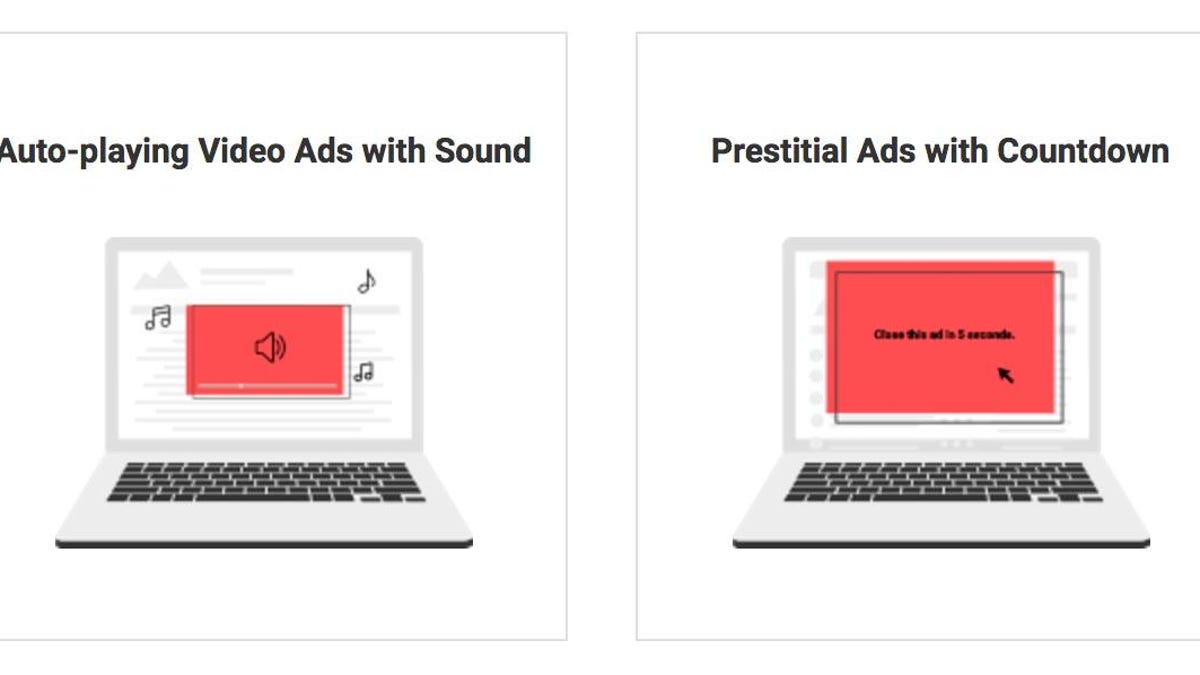Google to block some ads in Chrome -- even its own
In 2018, the online ad giant will walk a fine line between improving your life online and undermining publishers that rely on ads to survive.

Google Chrome in 2018 will follow the Coalition for Better Ads' standards by blocking several types of intrusive ads.
If you're a Chrome browser user, you'll start seeing fewer ads in 2018 when Google starts blocking ads that are more aggressive about getting your attention.
Google makes most of its money from online ads, but it and other publishers are threatened by the growing use of ad blockers that stop browsers from showing ads. Blockers can be installed in all browsers, but Opera Software's Opera has one built in and Brave Software's Brave browser blocks ads by default already.
The company believes some less annoying ads are better than none at all. In 2016, Google joined Facebook , Procter & Gamble, Unilever, the Washington Post and several advertising industry groups to form an alliance called the Coalition for Better Ads to try to strike the right balance. And Google announced Thursday just how far it'll go.
A Google Chrome lapel pin
"We plan to have Chrome stop showing ads (including those owned or served by Google) on websites that are not compliant with the Better Ads standards starting in early 2018," said Sridhar Ramaswamy, Google's senior vice president of ads and commerce, in a blog post.
Even a modest move to block only the most annoying ads is important when it comes from Google, though. Not only does it offer the world's most widely used browser, it also runs some of the web's biggest online properties and one of the biggest networks for placing ads all over the net. But while limiting its own advertising options is bad, Google's move signals that the company believes the current trajectory of online ads would be even worse.
Those standards mean no video ads that play automatically with sound, no pop-up ads, no ads that occlude web content until a timer finishes counting down, and no large ads that cover large portions of a website even as you scroll up or down. On mobile devices, the standards also bar ads that take up more than 30 percent of your screen or that flash.
The Wall Street Journal reported the Chrome ad blocker possibility in April.
It's a U-turn from Google's position last year, when the company said it wouldn't include an ad blocker in Chrome.
But Google isn't going as far as some ad-blocking technology.
Brave and plugins like Ghostery block ad trackers that can invade privacy. Even ads conforming to the Better Ads group's standards don't curtail that kind of behavior. That tracking can mean if you look at one website you might see an ad for its services later in Facebook, or if you search for a product on Amazon, you might see an ad for it later on another site. Ad tracking helps advertisers target ads at just the people they want, but that also means they gather an ever more detailed view of your personal information and interests.
Ad tracking, which runs programming code in your browser, also contributes to the problem that ads make websites load slowly, take up more memory, eat into your monthly network plan's data allowance, and run down your phone or laptop battery.
Google confirmed Chrome won't block ad tracking technology. In a statement, the Coalition for Better Ads said it didn't look into the matter.
"The consumer research that informed the development of the initial Better Ads Standards ranked 104 desktop and mobile web ad experiences on several attributes. The worst performing ads are identified in the Better Ads standards," the coalition said in a statement Thursday. "The standards do not address tracking as this was not part of the initial research."
First published June 1 at 3:54 p.m. PT.
Update, 5:31 p.m.: Adds comment from Google and the Coalition for Better Ads.
Solving for XX: The industry seeks to overcome outdated ideas about "women in tech."
CNET Magazine: Check out a sample of the stories in CNET's newsstand edition.

